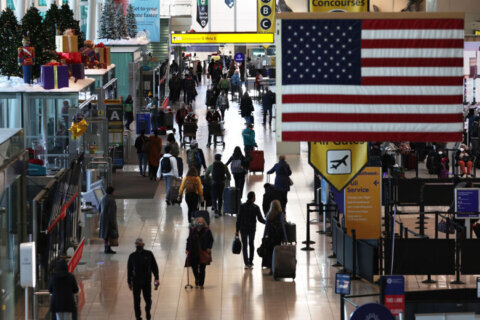WASHINGTON — Baltimore’s police commissioner has been replaced, effective immediately, as the city tries to reduce violence.
Baltimore Mayor Catherine E. Pugh replaced Commissioner Kevin Davis Friday with Deputy Commissioner Darryl D. DeSousa, a 30-year police veteran.
“I went through every single rank in the Baltimore Police Department,” DeSousa said at a morning news conference.
DeSousa, 53, will become Baltimore’s 40th police commissioner and the third commissioner in 2 1/2 years.
“Welcome to your new position,” Pugh said.
Baltimore has struggled with violent crime. The city recorded 343 homicides in 2017, setting a record for killings per capita, with 55.8 killings per 100,000 people. The city has about 615,000 residents.
“My decision is because I’m impatient,” Pugh said when asked why she replaced Davis with DeSousa. “We need to get these numbers down.”
“I need my police department to give me creative ideas,” she added.
DeSousa echoed those sentiments.
“The first priority is violence reduction, the second priority is violence reduction and the third is violence reduction,” DeSousa said.
“In 30 years, this is the best initiative I’ve seen.”
He said residents of Baltimore should expect to see a lot more uniformed officers on the street — starting right away.
The first wave of the new initiative started at 9 a.m. Friday and will run until midnight. DeSousa said he expects the increased police presence to last for a considerable amount of time.
Additional uniformed police officers are being placed in strategic “hot spots” around the city and that they would have “specific missions” to achieve, though he did not go into details.
“We’re coming for you,” DeSousa warned violent criminals, but he said the Baltimore Police Department would be doing so in a constitutional manner.
DeSousa’s appointment will require approvals for the position to become permanent.
“As I have made clear, reducing violence and restoring the confidence of our citizens in their police officers is my highest priority,” Pugh said in a release.
“The fact is, we are not achieving the pace of progress that our residents have every right to expect in the weeks since we ended what was nearly a record year for homicides in the City of Baltimore. As such, I have concluded that a change in leadership is needed at police headquarters.”
While 2017’s homicide numbers are shocking, the highest number of murders the city has seen is 353, back in 1993. At that time, the city had 121,000 more people than in 2017.
Pugh said DeSousa is widely respected by his fellow officers.
“I firmly believe that Commissioner-Designate DeSousa has the ideas, approach and demonstrated track record that will enable him to lead an accelerated effort to get criminals off our streets, reduce violence and restore public safety — and peace of mind — throughout the neighborhoods,” Pugh said.
“Baltimore has long been my home and I’ve spent my career on its streets and in its neighborhoods to address problems and bring about solutions,” DeSousa said, in a news release.
He appears to have the backing of the City Council and a number of Baltimore’s activists. Councilman Brandon Scott, who described DeSousa’s promotion as a “great decision,” said he has received numerous phone messages from community organizers praising the move.
“Never before did I get text messages from community leaders saying, ‘Thank you, this is the right choice,'” Scott said, describing the three previous times during his career as an elected official that a Baltimore police commissioner was replaced.
The change comes as a monitoring team is overseeing court-ordered reforms to Baltimore’s police department as part of a federal consent decree reached last January between Baltimore and the U.S. Justice Department due to widespread discriminatory and unconstitutional policing.
Sherrilyn Ifill, president of the NAACP Legal Defense and Educational Fund, said Davis had shown “unyielding commitment” to those reforms and they trust that DeSousa will bring “the same commitment to the consent decree process and to community-oriented reform.”
Pugh said she is grateful for the service Davis provided to the city.
Davis, the outgoing commissioner, replaced Commissioner Anthony Batts in July 2015 when then-Baltimore Mayor Stephanie Rawlings-Blake fired Commissioner Anthony Batts. Batts was commissioner during the Freddie Gray riots that rocked Baltimore.
Davis was a fourth-generation public safety professional. He also the son of a retired Prince George’s County police officer, and grandson and great-grandson to D.C. firefighters, according to his biography on the Baltimore Police Department’s website.
In a statement, Pugh — who took office as mayor in December 2016 and has said reducing crime is her No. 1 priority while boosting police recruits and improving long-neglected neighborhoods — described Davis as “hardworking.” A city initiative to chip away at violent crime by focusing attention on five troubled zones started in October, and the mayor believes it has been paying off.
“I am grateful to Commissioner Davis for all that he has done to implement the initiatives underway to address violent crime at its root causes,” she said.
Davis, previously chief of police in Maryland’s Anne Arundel County and assistant chief in Prince George’s County, was sworn in as Baltimore’s commissioner in October 2015 after serving on an interim basis for several months. He replaced Anthony Batts, who was fired after homicides spiked following the death of Freddie Gray, a black man whose fatal spinal cord injury in police custody triggered massive protests that year and the city’s worst riots in decades.
The Associated Press contributed to this report.









